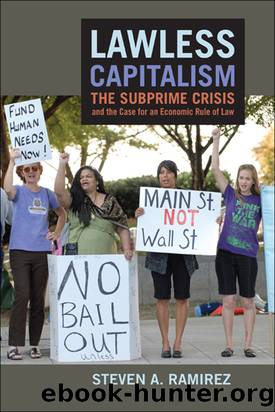Lawless capitalism by Steven A. Ramirez

Author:Steven A. Ramirez
Language: eng
Format: epub
ISBN: 9780814776490
Publisher: New York University Press
Published: 2013-08-15T00:00:00+00:00
The Power of Cultural Diversity
Of course, these losses constitute only the most direct costs of continuing to maintain a racialized society. Further costs include the losses relative to a society that not only takes affirmative action to resolve racial hierarchies but actually embraces the full potential of its human resources by seeking to harness cognitive diversity. Cultural diversity arises as a by-product of a racialized society, or from the different experiences of subgroups within a society, based upon a range of factors from gender to immigrant status. Cultural diversity can disrupt groupthink and affinity bias and can support superior creativity and cognition. Cultural diversity does not achieve these positive outcomes based upon morphological features but rather on different cognitive experiences and perspectives.
Social scientists identify groupthink as a problem of group decision making that arises from too much homogeneity. If groups are too similar and cohesive, they are more likely to adhere mindlessly to group norms and fail to question underlying assumptions that may operate to subvert sound decision making. Irving L. Janis wrote two volumes of case studies showing how groupthink led to flawed thinking and inferior outcomes at the apex of the American foreign policy establishment that persistently caused foreign policy elites to stumble into crises. Janis specifically identified group heterogeneity as one means by which groupthink may be disrupted and crises may be resolved.81 Outsiders may well be more inclined to question underlying assumptions than those who may well place too high a value on group acceptance.
Similarly, affinity bias (or in-group bias) operates to cloud judgment in favor of a person based upon relatively trivial commonalities.82 Compelling research over the past fifty years demonstrates that individuals hold a cognitive bias in favor of groups in which they enjoy membership. The bias operates even when group bonds seem arbitrary and meaningless, such as when coin flips define group membership.83 In-group bias displays its greatest strength when the group is defined based upon membership in a privileged or advantaged group, such as race or ethnicity. As Professor Nilanjana Dasgupta explains, affinity bias seems driven most powerfully by âthe tendency to prefer groups associated with the self as a confirmation of ⦠positive self-esteem, and the tendency to prefer groups valued by the mainstream culture as a confirmation of the sociopolitical order in society.â84 Thus, in-group bias holds powerful sway in circumstances where race matters.85 This necessarily means that in a variety of circumstancesâranging from boards of directors to judgesâsystematic errors can be expected anytime group membership may become salient, which is almost always.86 On some levels humans seem hardwired to behave in this way, as group membership identification no doubt has contributed to survival.87
Homosocial reproduction operates to establish unified group membership based upon important social characteristics. People in power display a proclivity to select applicants who closely mirror their own background. Naturally, women and racial minorities must face homosocial reproduction as yet another barrier to success. Homosocial reproduction further impedes their ability to form valuable networks.88 The payoff from homosocial reproduction for corporate elites lies in higher compensation driven by affinity bias.
Download
This site does not store any files on its server. We only index and link to content provided by other sites. Please contact the content providers to delete copyright contents if any and email us, we'll remove relevant links or contents immediately.
The Social Psychology of Inequality by Unknown(2311)
The Plant Paradox by Dr. Steven R. Gundry M.D(2040)
The Writing on the Wall by Anselm Jappe(1759)
Working for Yourself by J.D. (Nolo) Stephen Fishman(1478)
Every Landlord's Legal Guide by Janet Portman & Stewart Marcia & Ralph Warner(1325)
The First 20 Hours: How to Learn Anything ... Fast by Kaufman Josh(1304)
ADHD on Trial by Michael Gordon(1241)
Decisive by Chip Heath(1201)
Drafting Contracts: How and Why Lawyers Do What They Do, Second Edition by Stark Tina L(1171)
Working for Yourself by Stephen Fishman J.D. (Nolo)(1139)
The Economist Aug 8th 2015 by The Economist(1123)
Restitution by Restitution(1115)
The Economist Aug 29th 2015 by The Economist(1097)
A Practical Guide to International Arbitration in London by Hilary Heilbron(1084)
Intellectual Property Strategy by John Palfrey(1082)
The Lord of the Rings: The Fellowship of the Ring, the Two Towers, the Return of the King by J. R. R. Tolkien(1082)
Collusion by Luke Harding(1045)
Persuasion by Owner(1012)
Chapter 1 by Owner(950)
